Presentations from Advancing the use of research education in Europe
Presentations made during the EIPPEE 2012 Conference Advancing the use of education research in Europe are available to view below. Poster presentations are also available, along with slides from the training workshop that preceded the conference in May 2012.
Workshop 1 - Knowledge centres in Europe: development, possibilities and limitations
Chair: Hans Siggaard Jenson, Danish Clearinghouse for Educational Research, Denmark
Workshop lead: Elisabeth Buk-Berge, EPPI Centre, Institute of Education, University of London
This workshop looked at different examples of knowledge centres across Europe and the different rationales underpinning them (why they were set up, in what form and for whom). The workshop examined the experiences of existing knowledge centres, drawing out the implications for the future development of centres. It also explored how the different organisation, or set up, of knowledge centres can affect its functioning and role for example the impact of being located in a university or policy-making environment.
Objectives
- Develop awareness and understanding about knowledge centres:
- The different forms they can take and the actors involved;
- The overall aims and purpose;
- The specific audiences they target;
- The different methods they employ and activities engage in.
- Explore how the different form, organisation or set up, of knowledge centres can affect its functioning and role.
- Exchange experiences and lessons learned about the factors that influence the success or failure of such knowledge centres.
- Consider in what respect a knowledge centre can be evaluated.
Presentations
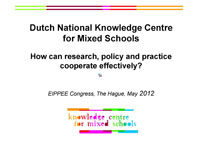 |
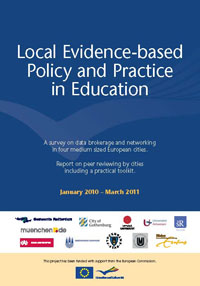 |
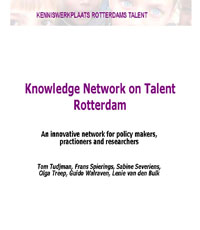 |
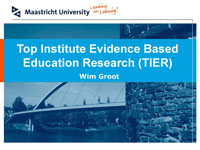 |
|

Linking Research, Policy and Practice to Promote Quality in Education: The case of the Dutch National Knowledge Centre for Mixed Schools
Joep Bakker, Eddie Denessen, Dorothee Peters and Guido Walraven (Dutch National Knowledge Centre for Mixed Schools)
|

Local Evidence-based Policy and Practice in Education
Marleen Baillieul, Olga Treep and Jan Vanhoof, (Institute for Information and Education Sciences, University of Antwerp)
|

Knowledge Network on Talent Rotterdam: An innovative network for policy makers, practioners and researchers
Tom Tudjman, Frans Spierings, Sabine Severiens, Olga Treep, Guido Walraven, Lenie van den Bulk (Risbo, Erasmus University Rotterdam, Dienst JOS, gemeente, Hogeschool van Rotterdam, InHolland, Rotterdam, Netherlands)
|

Top Institute Evidence Based Education Research (TIER)
Wim Groot (Maastricht University)
|
Workshop 2 - Harnessing technology for evidence use
Chair: Stefan Denzler, Swiss Coordination Centre for Research in Education (SKBF), Switzerland Workshop leads: James Thomas and Sergio Graziosi, EPPI Centre, Institute of Education, University of London This workshop discussed the issues involved in using technology to access evidence with a high relevance for use in a European context. It looked at a range of different technologies available to do this including websites and portals from across Europe. The session provided participants with specific training in Boolean searching and, using the EIPPEE portal, enabled participants to test out a range of different search strategies to see the different results they give. This workshop was hands-on and participants required a laptop or other PC. Objectives - Learn about the issues involved in finding relevant evidence.
- Explore the range of different initiatives that have attempted to make evidence easier to find.
- Develop advanced Boolean search skills – applicable in Google as well as the portal
- Raise awareness and understanding about the EIPPEE portal: its aims and scope.
- Develop knowledge and skills in undertaking searches using the EIPPEE portal.
- Discuss – and add to – the range of sources in the portal in terms of their ability to help people to identify and use relevant research evidence.
Presentation 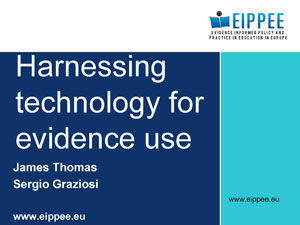 | | 
Harnessing technology for evidence use James Thomas and Sergio Graziosi (EPPI Centre, Institute of Education, University of London) |
Workshop 3 - Enabling evidence use in education practice
Chair: Jennifer Doran, National Council for Special Education (NCSE), Ireland
Workshop lead: Caroline Kenny, EPPI Centre, Institute of Education, University of London
This workshop focussed on the links between research and practitioners specifically. Issues such as how schools and teachers gather and deal with knowledge on issues like school improvement were explored as well as the significance of different relationships between school, city-level and national level decision-making on this process.
Objectives
- Develop awareness and understanding of how teachers and schools use evidence
- What types of evidence do they generally use?
- Where do they look and find such evidence?
- Is this done on an individual, collective or organisational level?
- Exchange experiences about the particular factors and/or circumstances that facilitate or challenge their use of evidence.
- Including knowledge, skills and understanding about how and where to find, use and understand evidence.
- The focus, content and presentation of available evidence.
- Contextual factors relating to school, local, regional and national policy-making and the relationships between them.
- Develop awareness and understanding about the ways that teachers and schools can be assisted to use evidence in their practice.
Presentations
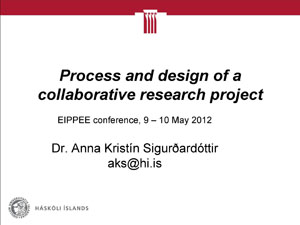 |
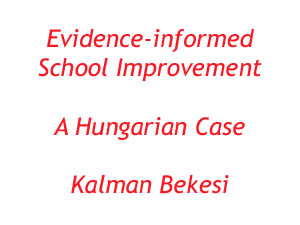 |
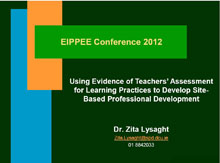 |
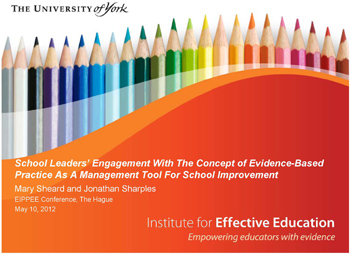 |
|

Process and design of a collaborative research project
Anna Kristín Sigurðardóttir (School of Education, University of Iceland)
|

Evidence-informed school improvement: A Hungarian case
Kalman Bekesi
|

Using evidence of teachers' assessment for learning practices to develop site-based professional development
Zita Lysaght (St. Patrick's College, Dublin)
|

School leaders' engagement with the concept of evidence-based practice as a management tool for school improvement
Mary Sheard and Jonathan Sharples (Institute for Effective Education, UK)
|
Workshop 4 - Studying and assessing the use of evidence
Chair: Maria Ranieri, Department of Sciences of Education and Cultural and Formative Processes (DSEPCF), University of Florence, Italy Workshop lead: Janice Tripney, EPPI Centre, Institute of Education, University of London A better understanding of the evidence production-to-use process gained through empirical study is important for advancing the use of research in education in Europe. Although there is increasing awareness that across Europe many different types of activities are used to link the research and decision-making worlds, empirical evidence about such activity is scarce. Since a robust evidence base is needed to guide research use activities, the EIPPEE project has developed a framework for studying research with the aim of encouraging and supporting new work in this field. The focus of this workshop was examination of different elements of this framework. The first day of the workshop considered research priorities/questions and conceptual frameworks, while the second day focused on the relevance and usefulness of different methodologies, and the extent to which indicators are a necessary component of this. The extent to which we can learn from exiting work conducted in other sectors was a theme running throughout workshop proceedings. A peer learning approach was followed. Both sessions were designed to be highly participative and involve whole- and small-group work built around a series of speaker presentations. The results of the workshop will be used to progress the work of the EIPPEE project and the debate will be continued online. Objectives - To engage with and discuss the usefulness of a framework for the study of research use;
- To apply this (or an adjusted framework to developing research priorities and strategies for the study of research use.
Presentations 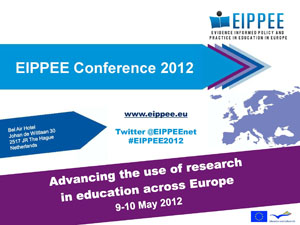 |  | 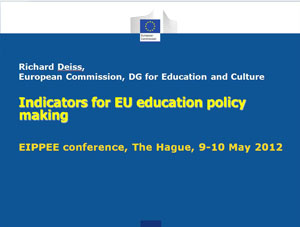 | | 
Workshop Day One | 
Workshop Day Two | 
Indicators for EU education policy making Richard Deiss (European Commission DG EAC) |
Workshop 5 - Stimulating policy-relevant research
Workshop lead: Hans Stegeman, Ministry of Education, Culture and Science, the Netherlands
Using examples of existing practice, this workshop explored different approaches across Europe to encourage policy-relevant research such as specific funding programmes, secondments, placements and partnerships. The workshop was designed to enable participants to share their knowledge and experiences in order to develop awareness about the range of possible actions in this area and the potential effectiveness of different strategies to stimulate more research with relevance for policy and practice.
Objectives
- Learn about institutional arrangements suited for stimulating policy-relevant research.
- Learn about various research methods suited for the use of research by policy-makers.
- Develop an understanding of the conditions under which policy-makers will make use of research.
- Exchange experiences and good practices in linking research with policy.
Presentations
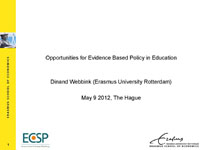 |
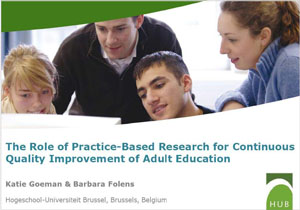 |
|

Opportunities for Evidence Based Policy in Education
Dinand Webbink (Erasmus School of Economics of the University of Rotterdam)
|

The Role of Practice-Based Research for Continuous Quality Improvement of Adult Education
Katie Goeman and Barbara Folens (Hogeschool-Universiteit Brussel, Brussels)
|
Workshop 6 - Using evidence for innovations in education
Workshop lead: Katrien Mondt, Department for Education and Training, Belgium
This workshop examined how existing evidence can be used to deliver/implement innovative education policies. It focussed specifically on how researchers, policy-makers and practitioners can work together to apply evidence in local contexts to address issues such as school improvement. The workshop also discussed more generally about how governments can act as mediators of evidence and provide guidance to practitioners on implementing evidence.
Objectives
- Raise awareness of innovative practices in education across Europe.
- Explore how innovations in education can be used to connect research with policy and practice.
- Exchange ideas, experiences and challenges about the design and implementation of innovative practices in education.
- Consider in what respect innovative practices in education can be evaluated.
Presentations
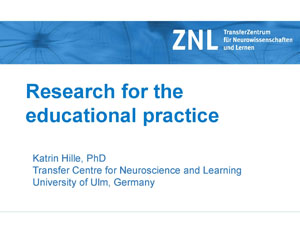 |
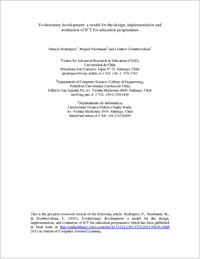 |
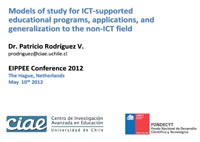 |
|

Research for the educational practice
Katrin Hille (ZNL - University of Ulm, Germany)
|

Evolutionary development: a model for the design, implementation and
evaluation of ICT for education programmes
Patricio Rodríguez (Universidad de Chile), Miguel Nussbaum (Pontificia Universidad Católica de Chile) and Lioubov Dombrovskaia (Universidad Técnica Federico Santa María)
|

Models of study for ICT-supported educational programs, applications and generalization to the non-ICT field
Patricio Rodriguez (CIAE - University of Chile, Santiago)
|
Twelve posters were presented that showcased the interesting work going on across Europe to study evidence informed policy and practice and achieve it in practice; including many examples of work being undertaken across South East and broader Europe.
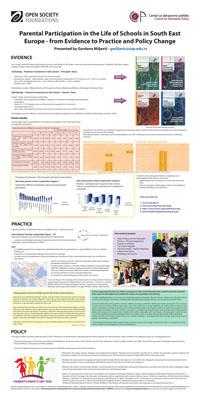 |
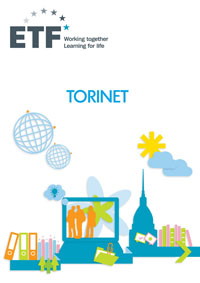 |
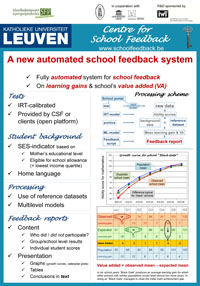 |
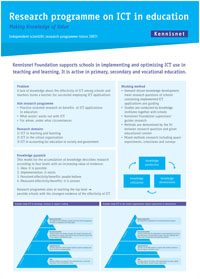 |
|

Parental Participation in the Life of Schools in South East Europe - from Evidence to Practice and Policy Change
Gordana Milijevic (Center for Education Policy, Serbia)
|

The Torino Process
Ian Cumming, F Crestani, (European Training Foundation (ETF), Torino, Italy)
|

A new automated school feedback system
Jan Van Damme (Centre for Educational Effectiveness and Evaluation Department for Educational Sciences (KU Leuven), Vandenheuvel l Institute, Belgium)
|

Research programme on ICT in education: Making knowledge of value
Kaj Van Zenderen (Kennisnet, Netherlands)
|
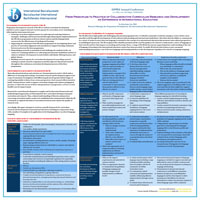 |
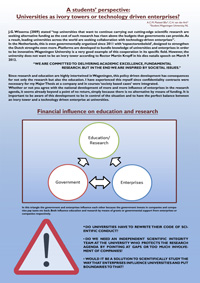 |
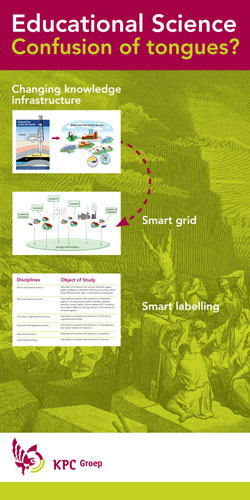 |
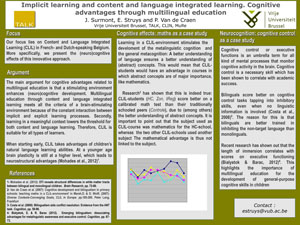 |

From Principles to Practice of Collaborative Curriculum Research and Development: an Experience in International Education
Kate Lin (International Baccalaureate, the Netherlands)
|

A student's pespective: Universities as ivory towers or technology driven enterprises?
Anouk Patel (Student, Wageningen, Netherlands)
|

Educational science: Confusion of tongues?
Hans Burgmans (KPC Groep, Den Bosch, Netherlands)
|

Implicit learning and content and language integrated learning. Cognitive advantages through multilingual education
J Sutmont, E Struys, (Vrije Universiteit Brussel (VUB), Belgium)
|
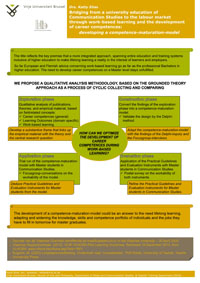 |
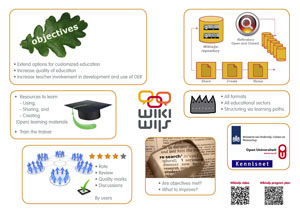 |
|
|
|

Bridging from a university education of Communication Studies to the labour market through work-based learning and the development of career competences: developing a competence-maturation-model
Katty Elias (Vrije Universiteit Brussel, Belgium)
|

Robert Schuwer (Open Universiteit Nederland (OUNL))
|
|
|
Training workshop presentation
Directly preceding the conference was a training workshop. This workshop introduced the concept of evidence informed policy and practice and demonstrated the role that systematic reviews can play in this process. It showed how systematic reviews can address all types of questions and analyse all types of quantitative and qualitative primary research. The workshop also explained the different stages involved in undertaking a systematic review.
In total, 26 participants from 12 different countries participated in this workshop including representatives from Belgium, Croatia, Hungary, Ireland, Italy, Netherlands, Norway, Romania, Serbia, Slovenia, Spain and United Kingdom. These participants came from a variety of roles including: a consultancy company; a non-governmental citizens’ association; national level policy-makers and research council; a representative from a European Union agency; a further education college; trade union; as well as representatives from different regional policy-making organisations.
|
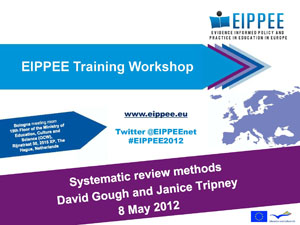 |
|

Systematic review methods
David Gough and Janice Tripney (EPPI Centre, Institute of Education, University of London)
|
Welcome - Hans Stegeman, Advisor, Ministry of Education, Culture and Science, the Netherlands
Welcome - David Gough, Professor of Evidence Informed Policy and Practice and Director, Social Science Research Unit and EPPI Centre, Institute of Education, University of London
'Evidence and Policy in Education - Bridging The Gap' - Micheline Scheys, Secretary-General, Department for Education and Training, Belgium
'Global Warming on Neuroscience and Education Navigating between Scylla and Charybdis' - Bruno della Chiesa, Senior Analyst, Organisation for Economic Co-operation and Development (OECD)
'The European Commission and policy on early school leaving' - Susanne Conze, Policy Officer, European Commission Directorate-General for Education and Culture
Review of day one - Katrien Mondt, Strategic Policy Support, Department for Education and Training, Belgium
'Transferring research (results) to policy makers and practitioners' - Frans Leeuw, Director, Ministry of Security and Justice Research Center (WODC) and Professor of Law, Public Policy and Social Science Research, Maastricht University, the Netherlands
Future directions - Panel Discussion
Closing Statements - Richard Deiss, Policy Officer, European Commission Directorate-General for Education and Culture
Conclusion and thanks - David Gough, Professor of Evidence Informed Policy and Practice and Director, Social Science Research Unit and EPPI Centre, Institute of Education, University of London
Note: the embedded Mp3 player is a product of neolao production, distributed under a Creative Commons License.
|